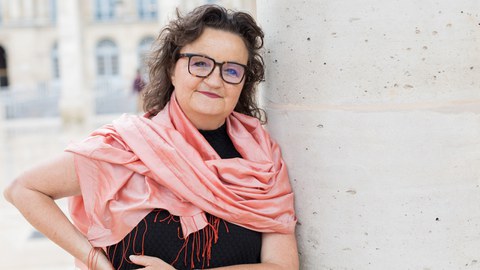Apr 14, 2023
Dr. Frances Guerin is a new Fellow at the Institute of Art and Music
Dr. Frances Guerin will be a Fellow with Prof. Dr. Kerstin Schankweiler, Chair of Visual Culture Studies in a Global Context, from April 16 to July 16. Frances Guerin is a scholar, critic and writer. She holds a PhD in Cinema Studies from New York University. She has taught film and visual culture at the University of Kent, Canterbury since 2001.
Frances’ research addresses the relationship between images and the historical world, and particularly, how experimental still and moving images represent, critique and challenge social and cultural convention. Her books include A Culture of Light: Cinema in 1920s Germany (University of Minnesota Press, 2005); The Image and the Witness: Trauma, Memory and Visual Culture (Columbia University Press, 2007); Through Amateur Eyes: Film and Photography in Nazi Germany (University of Minnesota Press, 2011); On Not Looking: The Paradox of Contemporary Visual Culture (2015); and The Truth is Always Grey: A History of Modernist Painting (University of Minnesota Press, 2018). Her latest book is on the work of contemporary American painter Jacqueline Humphries (Lund Humphries, 2022).
In the interview, she provides further insights into her research:
Name: Frances Guerin
Chair: Chair of Visual Culture Studies in a Global Context
Institute: Institute of Art and Music
Faculty: Faculty of Arts, Humanities and Social Science
What are your main interests as a researcher? Which topics do you focus on?
My work is motivated by a series of questions that investigate the relationship between modernist images and the historical world in which they are conceived, produced, exhibited and received. I am interested in questions such as: How do abstract images represent the world? How do people engage with these art forms and how can we describe this aesthetic experience? How do works of art negotiate their social reality? Particularly, as that social reality is defined by historical transformation, war, or traumatic historical events. Overall, I am interested in examining these questions through analysis of what and how twentieth-century film, art and visual culture make meaning (formally, aesthetically, materially), as well as how they enable new perspectives on the world.
What was your most interesting research topic so far?
My most interesting research topic is always the one that I am working on in the present. I tend to immerse myself in whatever I am working on, and the issues raised by the project become a lens through which I start to see the world. When images seduce me into writing about them, I think I have a responsibility to be fully engaged in what they have to show me!
What does your current research focus on?
I am currently working on two projects, the first of which is Cinematic Portrait Painting: (Not) about Gerhard Richter, the project that I will focus on in Dresden. It is a monograph that marries my long fascination with Gerhard Richter’s paintings and my intellectual commitment to avant-garde and experimental cinema. In the book, I explore qualities of Richter’s portraits – in the broadest sense of the term – for their characteristics that are more commonly associated with cinema. My approach is designed to demonstrate the portraits’ engagement with a number of broader issues. Thus, by using the cinema as a lens through which to see Richter’s portraits, we see their simultaneous re-definition and eschewal of traditional notions of portraiture, the identity of the artist, subjects depicted, viewers, and spaces of exhibition.
I am also working on a book of essays for a general public, What Am I Meant To Be Looking At? The book is a series of accessible essays that introduce readers to abstract paintings by well- and lesser-known, modern and contemporary artists. In each essay, my goal is to reveal how painting is an object in the world that opens a doorway to an understanding of aspects of the world that might have hitherto gone unnoticed. Or perhaps the paintings reveal perspectives of the world that have been deemed unimportant. In highly-readable essays, I hope to convince the reader that accessing and understanding abstract art is something we all do differently, that there is no single way to interpret it, and that what’s most important, is that we find the way in and subsequent meaning for ourselves.
Which item do you absolutely need at your workplace?
I do my research and writing in libraries, very rarely working at home. Although not an “item” strictly speaking, I work best when I am surrounded by other people. But there is a caveat: there must also be silence. For this reason, I tend not to work in public libraries and am more at home in university and research libraries. These institutions are usually filled with people like me.
Which book did you recently read? / Which movie/series did you watch recently?
My reading is diverse and voracious, making it difficult to isolate one particular book. Over the summer months, thanks to slim pickings in new releases, I have seen a lot of older films. My favourite was Luchino Visconti’s Ludwig (1973) on the big screen at the Cinémathèque Française. The film about the loner, esthete Ludwig II of Bavaria is so luscious in its camerawork and mise-en-scène that the four hours flew by.
More information about you can be found:
- Personal Website: www.francesguerin.com
- University of Kent Website: https://www.kent.ac.uk/arts/people/2132/guerin-frances
- Blog: http://fxreflects.blogspot.com/
- Twitter: https://twitter.com/frances_guerin
- Instagram: frances_guerin

